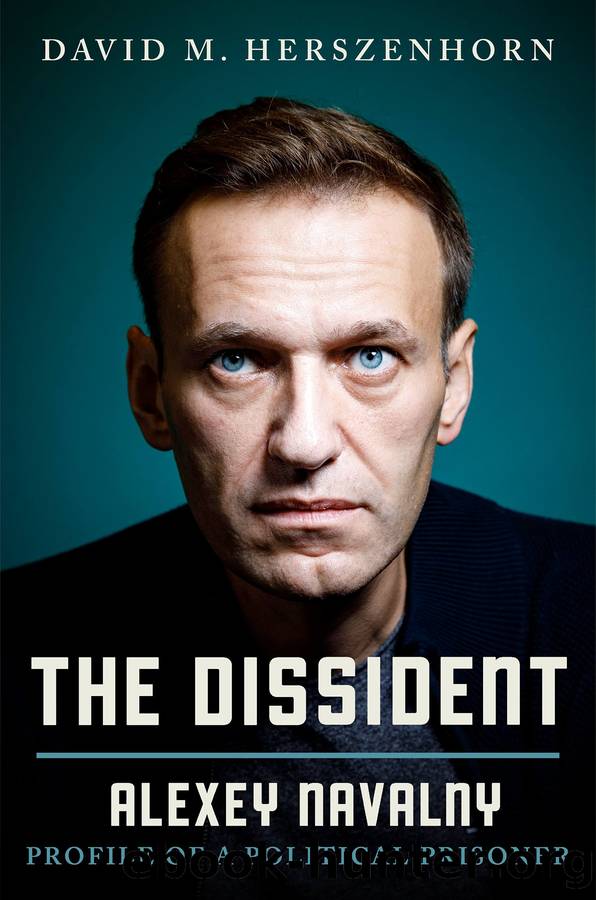The Dissident by David Herszenhorn

Author:David Herszenhorn [M. HERSZENHORN, DAVID]
Language: eng
Format: epub
Publisher: Grand Central Publishing
Published: 2023-10-30T00:00:00+00:00
For Navalny, the key deceptive development was Medvedevâs December 2008 nomination of Nikita Belykh, the former leader of the Union of Right Forces political party, to be governor of the Kirov region, a forested area located between Moscow and the Ural mountains.
Belykh was a year older than Navalny and one of the brightest young prospects in Russian opposition circles. The Union of Right Forces was founded by Anatoly Chubais and Yegor Gaidarâthe main proponents of Russiaâs post-Soviet liberal economic reformsâand would always be tarnished by the negative fallout of privatization, which yielded Russiaâs oligarchic system. Vast, previously state-controlled wealth, much of it tied to Russiaâs seemingly boundless natural resources, had ended up in the hands of a select few, many of them robber barons.
Originally, Navalny cheered those so-called reforms. But he later concluded that Chubais was a hypocrite and the man primarily responsible for Russiaâs path toward authoritarianism and crony capitalism. After preaching the gospel of private ownership, Chubais went on to earn a fortune running two state-owned companies, the power monopoly called Unified Energy System of Russia, or UES, and Rusnano, the government-financed nanotechnology firm.
âAs an erstwhile devotee of Yeltsin and Chubais, I can say that Chubais arouses more negative emotions in me now than Putin does,â Navalny told Voronkov. âItâs to none other than Chubais, I believe, that we owe the existence of Putinism.â
In 2015, Navalny got a chance to confront Chubais personally with his allegations of hypocrisy, appearing opposite him during a live, televised debate moderated by Ksenia Sobchak on TV-Rainn. Navalny opened by quoting âa wonderful, very smart personâ who in 2006 said: ââState capitalism is inefficient, almost always corrupt, and strategically not viable.â In 2006, that person was Anatoly Borisovich Chubais.â Navalny said Chubais had betrayed his younger self and that Rusnano should not exist in its state-owned form.
Chubais replied by saying that while Navalny had a potentially bright future as a politician, he was viewing the world in overly black and white terms. âAlexey Anatolyevich,â Chubais said, âplease donât confuse the term âstate capitalismâ with the term âstate companyââthese are not quite the same thing, or rather not at all the same thing.â
Navalny accused Rusnano of squandering public funds; Chubais insisted that the state could play a useful role as an incubator of innovation. The debate was anticlimactic, with no knockout blow from either side.
Future disagreements and disappointments aside, Navalny, in the late 2000s, had good reason to find common cause with the Union of Right Forces, known by its Russian acronym SPS.
Other founders of the party included avowed democratic politicians like Boris Nemtsov, the first post-Soviet governor of the Nizhny Novgorod region who later served as energy minister of Russia and as deputy prime minister in the late 1990s. He went on to become a deputy chairman of the State Duma, and the head of the SPS faction in the Duma, from 2000 to 2003.
Belykh had been a member of the legislative assembly in his native Perm region, which is adjacent to Kirov.
Download
This site does not store any files on its server. We only index and link to content provided by other sites. Please contact the content providers to delete copyright contents if any and email us, we'll remove relevant links or contents immediately.
| France | Germany |
| Great Britain | Greece |
| Italy | Rome |
| Russia | Spain & Portugal |
Fanny Burney by Claire Harman(25792)
Empire of the Sikhs by Patwant Singh(22185)
Out of India by Michael Foss(16315)
Leonardo da Vinci by Walter Isaacson(11918)
Small Great Things by Jodi Picoult(6108)
The Six Wives Of Henry VIII (WOMEN IN HISTORY) by Fraser Antonia(4799)
The Wind in My Hair by Masih Alinejad(4427)
The Lonely City by Olivia Laing(4126)
The Crown by Robert Lacey(4115)
A Higher Loyalty: Truth, Lies, and Leadership by James Comey(4039)
The Iron Duke by The Iron Duke(3650)
Millionaire: The Philanderer, Gambler, and Duelist Who Invented Modern Finance by Janet Gleeson(3576)
Sticky Fingers by Joe Hagan(3456)
Alive: The Story of the Andes Survivors by Piers Paul Read(3320)
Papillon (English) by Henri Charrière(3280)
Joan of Arc by Mary Gordon(3270)
Stalin by Stephen Kotkin(3091)
Aleister Crowley: The Biography by Tobias Churton(3026)
Ants Among Elephants by Sujatha Gidla(2928)
